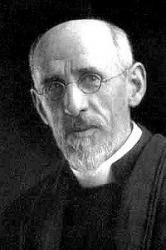Planning worship?
Check out our sister site, ZeteoSearch.org,
for 20+ additional resources related to your search.
- |
User Links
Person Results
T. A. Lacey

1853 - 1931 Person Name: Thomas A. Lacey Translator (from Latin) of "The Day Draws on with Golden Light" in The Cyber Hymnal Lacey, Thomas Alexander, s. of G. F. Lacey, was b. at Nottingham, Dec. 20, 1853. He entered Balliol Coll., Oxford, as an exhibitioner in 1871 (B.A. 1876, M.A. 1885), was ordained D. 1876, P. 1879, was from 1894 to 1903 Vicar of Madingley near Cambridge, and since then has been Chaplain of the London Diocesan Penitentiary. He was one of the Committee who compiled The English Hymnal, 1906, and contributed to it twelve translations (8, 66, 67, 69, 104, 123, 124, 174, 208, 226, 249, 325), also one unpublished and one previously published original, viz.,
1. O Faith of England, taught of old. [Church Defence.]
2. The dying robber raised his aching brow. [Good Friday.] First in the Treasury, Sept. 1905, p. 482, headed "Sursum."
Three other translations by him are noted at pp. 989, i. 1139, ii. [Rev. James Mearns, M.A.]
--John Julian, Dictionary of Hymnology, New Supplement (1907)
T. A. Lacey
Henry K. Oliver
1800 - 1885 Person Name: Henry Kemble Oliver Composer of "FEDERAL STREET" in The Cyber Hymnal Henry Kemble Oliver (b. Beverly, MA, 1800; d. Salem, MA, 1885) was educated at Harvard and Dartmouth. He taught in the public schools of Salem (1818-1842) and was superintendent of the Atlantic Cotton Mills in Lawrence, Massachusetts (1848-1858). His civic service included being mayor of Lawrence (18591861) and Salem (1877-1880), state treasurer (1861-1865), and organizer of the Massachusetts Bureau of Statistics and Labor (1867-1873). Oliver was organist at several churches, including Park Street Congregational Church in Boston, North Church in Salem, and the Unitarian Church in Lawrence. A founder of the Mozart Association and several choral societies in Salem, he published his hymn tunes in Hymn and Psalm Tunes (1860) and Original Hymn Tunes (1875).
Bert Polman
Henry K. Oliver
Ralph Vaughan Williams

1872 - 1958 Person Name: R. V. W. Harmonizer of "RESURREXIT" in The New English Hymnal Through his composing, conducting, collecting, editing, and teaching, Ralph Vaughan Williams (b. Down Ampney, Gloucestershire, England, October 12, 1872; d. Westminster, London, England, August 26, 1958) became the chief figure in the realm of English music and church music in the first half of the twentieth century. His education included instruction at the Royal College of Music in London and Trinity College, Cambridge, as well as additional studies in Berlin and Paris. During World War I he served in the army medical corps in France. Vaughan Williams taught music at the Royal College of Music (1920-1940), conducted the Bach Choir in London (1920-1927), and directed the Leith Hill Music Festival in Dorking (1905-1953). A major influence in his life was the English folk song. A knowledgeable collector of folk songs, he was also a member of the Folksong Society and a supporter of the English Folk Dance Society. Vaughan Williams wrote various articles and books, including National Music (1935), and composed numerous arrangements of folk songs; many of his compositions show the impact of folk rhythms and melodic modes. His original compositions cover nearly all musical genres, from orchestral symphonies and concertos to choral works, from songs to operas, and from chamber music to music for films. Vaughan Williams's church music includes anthems; choral-orchestral works, such as Magnificat (1932), Dona Nobis Pacem (1936), and Hodie (1953); and hymn tune settings for organ. But most important to the history of hymnody, he was music editor of the most influential British hymnal at the beginning of the twentieth century, The English Hymnal (1906), and coeditor (with Martin Shaw) of Songs of Praise (1925, 1931) and the Oxford Book of Carols (1928).
Bert Polman
Ralph Vaughan Williams
Edward C. Bairstow

1874 - 1946 Composer of "AURORA LUCIS RUBILAT" in The Church Anthem Book
Edward C. Bairstow


 My Starred Hymns
My Starred Hymns

